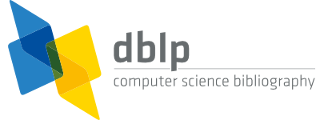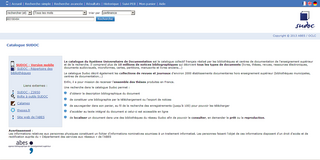MEDLINE is a bibliographic database of life sciences and biomedical information. It includes bibliographic information for articles from academic journals covering medicine, nursing, pharmacy, dentistry, veterinary medicine, and health care. MEDLINE also covers much of the literature in biology and biochemistry, as well as fields such as molecular evolution.
This page is a glossary of library and information science.
A discovery system is a bibliographic search system based on search engine technology. It is part of the concept of Library 2.0 and is intended to supplement or even replace the existing OPAC catalogs. These systems emerged in the late 2000s in response to user desire for a more convenient search option similar to that of internet search engine.

DBLP is a computer science bibliography website. Starting in 1993 at Universität Trier in Germany, it grew from a small collection of HTML files and became an organization hosting a database and logic programming bibliography site. Since November 2018, DBLP is a branch of Schloss Dagstuhl – Leibniz-Zentrum für Informatik (LZI). DBLP listed more than 5.4 million journal articles, conference papers, and other publications on computer science in December 2020, up from about 14,000 in 1995 and 3.66 million in July 2016. All important journals on computer science are tracked. Proceedings papers of many conferences are also tracked. It is mirrored at three sites across the Internet.
Query languages or data query languages (DQLs) are computer languages used to make queries in databases and information systems.

OCLC, Inc., doing business as OCLC, is an American nonprofit cooperative organization "dedicated to the public purposes of furthering access to the world's information and reducing information costs". It was founded in 1967 as the Ohio College Library Center, then became the Online Computer Library Center as it expanded. In 2017, the name was formally changed to OCLC, Inc. OCLC and its member libraries cooperatively produce and maintain WorldCat, the largest online public access catalog (OPAC) in the world. OCLC is funded mainly by the fees that libraries pay for the many different services it offers. OCLC also maintains the Dewey Decimal Classification system.
In text retrieval, full-text search refers to techniques for searching a single computer-stored document or a collection in a full-text database. Full-text search is distinguished from searches based on metadata or on parts of the original texts represented in databases.

WorldCat is a union catalog that itemizes the collections of 15,600 libraries in 107 countries that participate in the OCLC global cooperative. It is operated by OCLC, Inc. The subscribing member libraries collectively maintain WorldCat's database, the world's largest bibliographic database. The database includes other information sources in addition to member library collections. OCLC makes WorldCat itself available free to libraries, but the catalog is the foundation for other subscription OCLC services. WorldCat is used by the general public and by librarians for cataloging and research.

COBISS is the Slovenian library information system, developed by the Institute of Information Science (IZUM) in Maribor, Slovenia. COBISS is the organizational model of connecting libraries into a national library information system with shared cataloging, the COBIB union bibliographic/catalog database and local databases of participating libraries, the COLIB database on libraries, the CONOR authority database, and several other resources and functionalities.
A bibliographic database is a database of bibliographic records, an organized digital collection of references to published literature, including journal and newspaper articles, conference proceedings, reports, government and legal publications, patents, books, etc. In contrast to library catalogue entries, a large proportion of the bibliographic records in bibliographic databases describe articles, conference papers, etc., rather than complete monographs, and they generally contain very rich subject descriptions in the form of keywords, subject classification terms, or abstracts.
Serials Solutions was a division of ProQuest that provided e-resource access and management services (ERAMS) to libraries. These products enabled librarians to more easily manage electronic resources that serve the needs of their users. Serials Solutions became part of ProQuest Workflow Solutions in 2011 and the "Serials Solutions" name was retired in 2014. In 2015, Proquest acquired Ex Libris Group, a library automation company with many similar products to those of ProQuest Workflow Solutions. The Workflow Solutions division was to be merged with Ex Libris into a new business group called Ex Libris, a ProQuest Company.
LIBRIS is a Swedish national union catalogue maintained by the National Library of Sweden in Stockholm. It is possible to freely search about 6.5 million titles nationwide.
BRS/Search is a full-text database and information retrieval system. BRS/Search uses a fully inverted indexing system to store, locate, and retrieve unstructured data. It was the search engine that in 1977 powered Bibliographic Retrieval Services (BRS) commercial operations with 20 databases ; it has changed ownership several times during its development and is currently sold as Livelink ECM Discovery Server by Open Text Corporation.

BASE is a multi-disciplinary search engine to scholarly internet resources, created by Bielefeld University Library in Bielefeld, Germany. It is based on free and open-source software such as Apache Solr and VuFind. It harvests OAI metadata from institutional repositories and other academic digital libraries that implement the Open Archives Initiative Protocol for Metadata Harvesting (OAI-PMH), and then normalizes and indexes the data for searching. In addition to OAI metadata, the library indexes selected web sites and local data collections, all of which can be searched via a single search interface.
A bibliographic index is a bibliography intended to help find a publication. Citations are usually listed by author and subject in separate sections, or in a single alphabetical sequence under a system of authorized headings collectively known as controlled vocabulary, developed over time by the indexing service. Indexes of this kind are issued in print periodical form, online, or both. Since the 1970s they are typically generated as output from bibliographic databases.
ArnetMiner is a free online service used to index, search, and mine big scientific data.

Trove is an Australian online library database aggregator and service which includes full text documents, digital images, bibliographic and holdings data of items which are not available digitally, and a free faceted-search engine as a discovery tool. The database includes archives, images, newspapers, official documents, archived websites, manuscripts and other types of data. Hosted by the National Library of Australia in partnership with content providers, including members of the National and State Libraries Australia, it is one of the most well-respected and accessed GLAM services in Australia, with over 70,000 daily users.
EMBiology is a bibliographic database established in June 2005, and produced by Elsevier. EMBiology focuses on indexing the literature in the life sciences in general. Coverage includes science in the laboratory and science in the field. It is designed to be smaller than EMBASE, with abstracting and indexing for 1,800 journals not covered by the larger database. However, there is some overlap. Hence, EMBiology is specifically designed for academic institutions that range from small to mid-size and all biotechnology and pharmaceutical companies.

The système universitaire de documentation or SUDOC is a system used by the libraries of French universities and higher education establishments to identify, track and manage the documents in their possession. The catalog, which contains nearly 13 million references, allows students and researchers to search for bibliographical and location information in more than 3,400 documentation centers. It is maintained by the Bibliographic Agency for Higher Education (ABES).
The Clearinghouse for Networked Information Discovery and Retrieval or CNIDR was an organization funded by the U.S. National Science Foundation from 1993 to 1997 and based at the Microelectronics Center of North Carolina (MCNC) in Research Triangle Park. CNIDR was active in the research and development of open source software and open standards, centered on information discovery and retrieval, in the emerging Internet.






